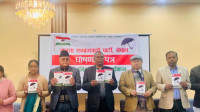National
Serious human rights violations against Dalits reported during lockdown
Parliamentary committee orders the government to book culprits.Tika R Pradhan
The Covid-19 pandemic and the subsequent lockdown might have put many social activities on hold, but age-old caste-based discrimination has continued.
On Saturday, locals from Chaurjahari Municipality in Rukum-West chased away a wedding party of groom-to-be Navaraj BK Jajarkot, who was to tie the knot with a girl from the town, after they found out that the girl was not from the same caste as that of BK.
A day later, BK and his friend Tikaram Sunar, both of them Dalits, were found dead on the banks of the Bheri river.
The Covid-19 pandemic, with its social distancing norms, is already reifying age-old discriminatory practices against the so-called ‘lower’ castes, especially Dalits, long considered as “untouchable”.
BK and Sunar’s murder shows how deep-rooted caste-based discrimination is in Nepal, says rights activists. Several other discriminaton-related cases have been reported around the country during the lockdown, they say.
One of the cases involves Krishna Bahadur Thapa, a member of the Gandaki Provincial Assembly. Thapa recently supported a group of people who arrested on charge of caste-based discrimination for denying a Dalit family entry into a public building to perform the last rites of a man.
Many ruling party leaders and rights activists have demanded Thapa’s resignation and his apology for supporting caste-based discrimination.
However, in his statement, Thapa said that the arrest order was issued to disturb social harmony.
Thapa, who is also Nepal Communist Party’s Kaski district committee chief, has been ignoring demands for his resignation, and his party has remained silent on the issue.
Following the reporting of a spate of cases related to caste-based discrimination, Parliament’s Law, Justice and Human Rights Committee on Monday directed the Ministry of Home Affairs to to intvestigate all the incidents of discriminations, rape and murder during the lockdown.
“Serious attention of the committee has been drawn to incidents of caste-based discrimination, untouchability, rape and murder during the lockdown,” said the committee.
Pointing out specific incidents, including the gang rape of Dalit girls in Dhankuta and Morang, caste-based discrimination in Kapilvastu and Kaski, murder and enforced disappearance in Rukum West, and forced abortion in Panchthar, the parliamentary committee has told the government to take necessary action against culprits immediately.
With at least a dozen cases of caste-based discriminations and human rights violations meted out on Dalit communities ever since the country imposed a lockdown, the government has not developed any mechanism to address the woes of people in the lowest strata of the society, activists say.
Advocate Prakash Nepali, a legal advisor for Samata Foundation, said that in Achham, only people from Dalit communities returning home from abroad were quarantined while others were allowed to go home.
He also said members of Dalit communities were also discriminated against during the distribution of relief materials in Chapakot, Syangja district. But nothing has been done to take action against the culprits, activists say.
“The Dalit NGO Federation has urged the government to bring about a special package for victims of discrimination by a conducting rapid assessment, but to no avail,” said Bhakta Biswokarma, acting President of DNF.
Various right-based organisations have called on the government to adopt the principle of fundamental equality and take special measures to provide health care and treatment.
Different organisations, including DNF have strongly urged the government to announce a special relief package for Dalits, who are mostly engaged in the informal service sector and rely on daily wages.




 17.12°C Kathmandu
17.12°C Kathmandu















